Oman
Launch of the Decade of Action for Road Safety in Oman
11 May 2011
Oman joined countries around the world in launching the UN Decade of Action for Road Safety on Wednesday, 11 May 2011. The launch was prepared by a number of partners including were held with the Ministry of Health, police, ORSA, WHO and UNICEF.
The ceremony was held at the Traffic Safety Institute under the patronage of the Inspector General of Police & Customs and Chair of the National Committee on Road Safety. Numerous high level officials representing the various stakeholders involved with road safety in Oman attended this high profile event.
Opening speeches were given by WHO and UNICEF, the two UN agencies involved with road safety in Oman. In her speech, WHO Representative in Oman noted that despite great efforts undertaken nationally to address road safety, much work remains to be done including addressing individual behaviour, particularly among young people.
The Director General of Traffic of Oman provided a presentation on the overall actions that have taken place in road safety in Oman. The Ministry of Health also prepared a folder with advocacy material from the Royal Oman Police.
Civil Society had a voice as well. The Oman Road Safety Association (ORSA), a non-governmental organization, presented their work in the area of road safety. Moreover on 15 May, ORSA organized an event to endorse the UN Decade of Action and to mark the beginning of a campaign on “Time for Action.”
Both events were widely covered by both the Arabic and English media.
[LINKS TO
Message by Dr Jihane Tawilah, WHO Representative in Oman
English, Arabic
Launch programme
PENDING LIBRARY]
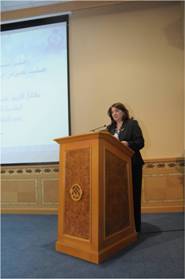 |
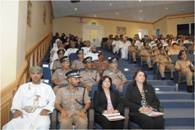 |
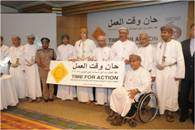 |
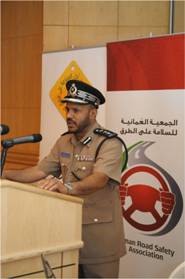 |
Iraq committed to improving road safety
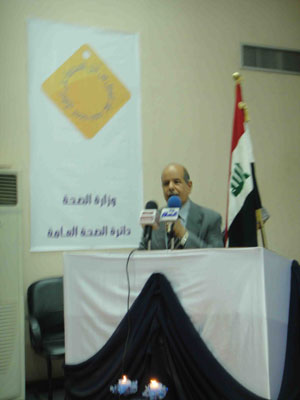 Iraq committed to improving road safety
Iraq committed to improving road safety
Baghdad, 11 May 2011
Iraq launches the Decade of Action for Road Safety 2011–2020 and pledges to reduce the level of road traffic fatalities by 2020.
“Road traffic crashes rank as one of the leading causes of mortality in Iraq. About 75 000 lives were lost during the period 1979–2005 due to road traffic crashes. In 2005, despite the restrictions on movement in place due the security situation in Iraq, still there were 1789 deaths caused by road traffic crashes,” said H.E the Minister of Health in Iraq, Dr Majid Hamad Amin. Adding that, “Although road traffic injuries are a major public health problem, it has been viewed in public health traditionally as an 'accident' and as a random event that happens to others. Such events are looked upon as an inevitable outcome of road transport.
The Iraq Ministry of Health 2009 Annual Report revealed that in Iraq, the injury toll from road accidents is almost four times greater than that from acts of terrorism. H.E Dr Majid affirmed that, “The time is right to shape our future - comprehensive laws should be in place and more collaboration and cooperation is needed to endorse the Decade of Action for Road Safety programme and start the implementation process of a national plan that would involve many sectors: transport, health, education, communications, and across many types of institutions to prevent the growing number of road accidents, save lives and strengthen the services provided for road accident victims.”
Dr Taher Hawrami, the Minister of Health in the Kurdistan Region in Iraq stressed that road safety has become a major national health objective and said “Further development of road infrastructure and traffic regulation is key to saving human lives and promoting economic development.”
The Ministry of Health and the Ministry of Interior with the full cooperation of WHO marked the day to launch the Decade of Action for Road Safety at the Ministries of Health in Baghdad and Kurdistan Region in the presence of hundreds of delegates representing the Iraq Parliament, related ministries, academic institutions, civil society and media representatives.
The WHO Representative in Iraq Dr Syed Jaffer Hussain informed that the Decade of Action for Road Safety from 2011-2020 is the result of UN General Assembly Resolution and stated that “It outlines steps towards improving the safety of roads and vehicles, enhancing emergency services, and building up road safety management.” He explained further that it is also calls for increased legislation and enforcement on using helmets, seatbelts and child restraints and avoiding speeding while driving. WHO will play a role in coordinating global efforts over the Decade and will monitor progress towards achieving the objectives of the Decade at the national and international levels. He emphasized that "Road traffic injuries and the resultant deaths and disabilities is a major and has been a neglected public health challenge that requires concerted efforts for effective and sustainable prevention. Of all the systems with which people have to deal with every day, road traffic systems are the most complex and the most dangerous.
However, in the recent years, WHO and other UN partners have been able to position the issue a grave public health concern and push it high on global political agendas. That is why the role that is enshrined for the Ministries of Health in the UN General Assembly Resolution is very crucial. In order for the countries to effectively respond to this growing public health burden, the Organization seeks through its publications to support national health strategies and address the most pressing public health concerns of populations around the world. To respond to the needs of the Member States at all levels of development, WHO publishes practical manuals, handbooks and training material for specific categories of health workers; internationally applicable guidelines and standards; reviews and analyses of health policies, programmes and research and state-of-the-art consensus reports that offer technical advice and recommendations for decision-makers
“Everyone can play a part to bring about change and prevent unnecessary deaths and injuries due to road traffic accidents”. Dr Jaffer further added that with the high level of political commitment, the implementation of good practices and the collaboration of various stakeholders of society towards the creation of a culture of safety first, this goal can well be achieved.
Iraq committed to improving road safety | Arabic
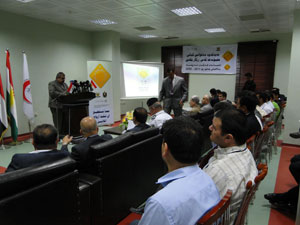 |
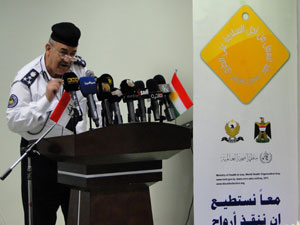 |
Egypt
Egypt road safety media workshop
 Participants of the Egypt road safety media workshopThe Egypt road safety media workshop was held on 11 December 2011 in Cairo, Egypt, as one of a series of similar workshops organized by WHO in countries that are part of the road safety in 10 countries project. The workshop was a collaborative effort by WHO at the global, regional and country levels and members of the road safety in 10 countries project, national working groups from different sectors, including health, traffic police, transport, academia, nongovernmental organizations and others. It was attended by about 30 journalists from print and audi-visual media.
Participants of the Egypt road safety media workshopThe Egypt road safety media workshop was held on 11 December 2011 in Cairo, Egypt, as one of a series of similar workshops organized by WHO in countries that are part of the road safety in 10 countries project. The workshop was a collaborative effort by WHO at the global, regional and country levels and members of the road safety in 10 countries project, national working groups from different sectors, including health, traffic police, transport, academia, nongovernmental organizations and others. It was attended by about 30 journalists from print and audi-visual media.
The need for the workshop stemmed from the great influence that journalists and media have on public opinion and of them being key in the advocacy for road safety among individuals, communities and decision-makers at the highest levels.
The objectives of the workshop were to:
- foster an in-depth understanding of main concepts around road safety in Egypt
- promote a shift in coverage from basic reporting of road safety news and individual stories to their utilization as a foundation for addressing road safety as a whole with clear analysis of causes and consequences
- promote constructive reporting through the inclusion of feasible evidence-based solutions as an integral part of road safety coverage, whether print or audiovisual
- agree on a mechanism for feedback to the WHO Egypt country office on road safety media coverage.
Launch of the Decade of Action on Road Safety
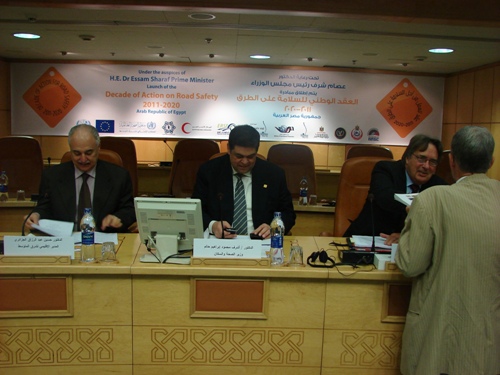
Under the auspices of His Excellency Dr Essam Sharaf, Prime Minister of Egypt, the Decade of Action on Road Safety 2011–2020 was launched in Egypt on 11 May 2011.
Dr Ashraf Hatem, Minister of Health, spoke on behalf of H.E. the Prime Minister and emphasized the collaborative role of different sectors in working together to implement national plans to improve road safety. Dr Hussein A. Gezairy, former WHO Regional Director for the Eastern Mediterranean, acknowledged the declaration of the Decade of Action by the United Nations General Assembly as a major step in the direction towards safer roads for the well-being of all people across the globe. This initiative also witnessed the launch of the Traffic Sign Campaign for children aged 4–12. Ambassador Marc Franco, head of the European Union delegation to Egypt, emphasized the importance of the initiative and the high commitment of the European Union towards sharing the goals of the Decade of Action, which comes at the end of a twinning project of 2008–2010 between the European Union and Government of Egypt.
The ceremony was attended by officials from the Government of Egypt, Ministry of International Cooperation and the National Road Safety Council and by a delegation of the European Union to Egypt. Media representatives from different television channels such as Nile TV, Nile News and News Sector were also present, along with members of the press.
Egypt road safety in 10 countries project

According to the Global status report on road safety, 12 000 lives are lost annually to road traffic crashes in Egypt with a fatality rate of 42 deaths per 100 000 population. Almost 5% of those deaths are borne by four-wheeler passengers, followed by pedestrians at 20% of the death burden.
Different related laws are in place, including laws on speed, seat belts, helmets and blood–alcohol concentration. However, enforcement of these laws remains inadequate.
Egypt is one of the 10 countries of the road safety in 10 countries project conducted over 5-years 2010–2014 by a consortium of six international partners – WHO, the Global Road Safety Partnership, the International Injury Research Unit at Johns Hopkins University and the Association for Safe International Travel, with funding from The Bloomberg Family Foundation. The project focuses on different aspects of road traffic injury prevention in 10 low- and middle-income countries across the world: Brazil, Cambodia, China, Egypt, India, Kenya, Mexico, Russian Federation, Turkey and Viet Nam. In Kenya and Egypt the project also focuses on data system development and in Kenya and India on trauma care.
The road safety project in Egypt is led by a working group, including representatives from the Ministries of Interior, Education, and Health, as well as academia, trauma care services and nongovernmental organizations. The WHO country office coordinates the project. Activities focus on controlling speed and increasing seat-belt wearing rate, in addition to data system development.
Egypt road safety in 10 countries project fact sheet [pdf 1.53Mb]
Status of road safety in Egypt [pdf 210kb]
Egypt country profile - English [pdf 496kb] | Arabic [pdf 1.12Mb]


